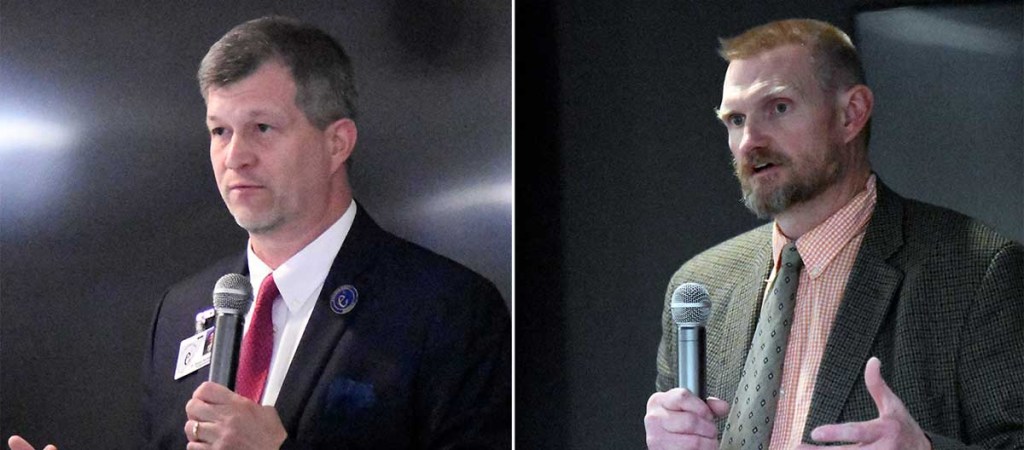Cullman County Schools Superintendent candidates field questions at GOP forum
Published 12:15 am Saturday, February 17, 2024

- Incumbent Cullman County Schools Superintendent Dr. Shane Barnette, left, and challenger Morris Williams field questions during Tuesday evening’s GOP forum.
After spending a decade operating under an unelected, board-approved hiring process, the position of Cullman County Schools superintendent was returned to its former elected-position status in a 2022 ballot measure approved by local voters.
Now the effects of that referendum decision are making themselves felt, as county residents get set to head to the primary polls on March 5, to choose between incumbent superintendent Dr. Shane Barnette and challenger Morris Williams, a longtime teacher at Holly Pond High School.
At a recent Q&A forum hosted by the Cullman County GOP, each of the Republican candidates weighed in on a range of timely topics affecting education, from the state of mental health in local schools, to future issues that could test the system’s finite resources. Barnette and Williams agreed on many of the tests that the county school system faces, though they diverged when it comes to prioritizing which ones are likely to matter most during the upcoming superintendent’s term.
Funding, retaining quality teachers and student mental health rated as Williams’ top three system-wide priorities, with Williams expressing concern that a recent infusion of federal stimulus funds related to COVID-19 would soon be expiring. “I hope we have used it well,” he said, “but I wonder what the future’s going to hold when we don’t have those checks coming in from the federal government.”
Barnette said that the school system should move through that transition with a minimum of financial risk, thanks to big-picture spending that targeted significant, non-recurring school improvements under his recent leadership. He also identified larger cultural factors as posing an imminent test for county schools, noting that “some of the biggest challenges that we have, moving forward, are probably not specific to Cullman County … [we need to] put God back into schools, to be honest.”
School choice is likely to be a hot topic across Alabama in the coming years, as the legislature takes up a bill supported by Republican Gov. Kay Ivey that could allocate up to $7,000 per student to supplement parents’ decision to place their children away from public education and into private schooling.
Williams said he’s approaching the school choice issue with trepidation, cautious, as a fiscal conservative, that an eventual funding law could burden taxpayers and potentially even “damage public schools” if a critical mass of opt-outs leaves the system. But, he added, he’s supportive of parents’ right to decide the best course for their children’s educational future.
Barnette explained that a school choice law may ultimately harm local school systems’ finances — not because of their local performance, but because funding reductions under such a law could affect all statewide systems equally, no matter their relative academic performance.
“If you understand the way that public education is funded in Alabama, that money comes off the top, and then what’s remaining is divided up. So, even if it doesn’t affect us with a bunch of kids being pulled out of Cullman County Schools, the funding that comes to Cullman County is greatly reduced — so it will affect us … We need to pay close attention to that, because if they pull 1,000 kids out of Montgomery public schools, and that money goes somewhere else, our money for Cullman County Schools goes down considerably.”
Like his city-schools superintendent colleague Kyle Kallhoff, Barnette said his acceptance of a school choice law is partly contingent on how the state holds private-schooled students to an academic standard. “Hold those same people accountable for their learning as we’re held accountable for our learning in public schools,” he stressed. “If we give a standardized test, which we’re required to do and we get a state report card, then give every private school; every homeschooled child that same exact test and see where they measure up against us. I guarantee you that Cullman County Schools will be just as good, or better, than all of the home schools and all the private schools.”
Williams has criticized the school system’s current superintendent’s pay structure, which favors years of experience in the superintendent’s position, describing it as obstructive to new candidates who seek election against an established incumbent like Barnette.
“I’ve looked at it, and I haven’t seen anything like that in other systems,” he said in response to a question about the pay schedule. “… [The school board] said the intention was so that just not anyone could run for this office. There’s a danger in that: What you’re doing is candidate filtering. I’m not bucking about the pay — it’s not about ‘I ought to get more money.’ It’s the principle behind that. That’s where we’re going wrong, folks. You don’t candidate-filter like that. You don’t set up obstacles to running.”
Barnette said he had “no input” into how the board structures the superintendent’s pay, but that he understands its apparent collective thinking, which rewards the superintendent, just as the state rewards its employed teachers, for remaining and progressing in the role.
“I think the logic behind that was that they value experience,” he said, likening experience-based pay with that of a seasoned contracted home electrician whom he’d pay a premium to wire his house over the less-costly services of a relative professional newcomer.
“Through the years, I’m sure it’ll have to be adjusted,” he said of the pay schedule. “But their thought process was that somebody who has no experience shouldn’t make what somebody has all the way at the other end.”
Voters will choose between Barnette and Williams on March 5, when the Republican Party primary election will effectively determine the winner of the Cullman County School superintendent’s race. The primary winner will face no Democratic Party opposition in the November General Election.





